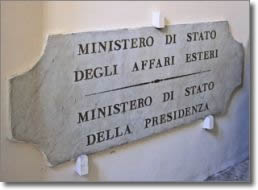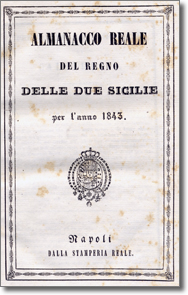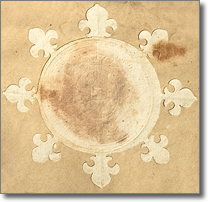The last trace

The change of use of the building from "great palazzo of the ministries" to Town Hall meant the removal of all emblems and plaques, the restructuring of spaces and rooms, the moving around of funishings - a chaos that gradually transformed the original layout of the interior of the "premises of San Giacomo".
In a room on the landing between the first and the second floor there survives the last piece of evidence that the Ministries of State of the Kingdom of the Two Sicilies were once housed here.
The surviving plaque showed the layout of the offices of the Royal Secretary and ministry of State of the Presidency of the Council of Ministers and of the Royal Secretary and ministry of Stateof Foreign Affairs, ministries which worked on the first floor of the palazzo.

- Frontispiece of the Royal Almanac, 1843
The competences of the two ministries
In October 1822 the Council of Ministers was created with the function of coordinating and preparing the acts proposed by the various ministries for "royal approval".
The president was the Councillor Minister of State, who was charged by the king to chair the ordinary meetings of the Council of State in the sovereign's absence.
The President of the Council of Ministers was obliged to "remain in the place of the King's ordinary residence".
Among the functions and competences of the Ministry of State of the Presidence of the Council of Ministers were: custody of the royal seal, the conservation of the original copies of the laws and decrees signed by the king, by the president of the Council and the by competent ministers, the Royal Printing Office (located in the ex-monastery of the Rosario di Palazzo, in the Spanish Quarters) where the collection of laws and cecrees of the royals of the Kingdom of the Two Sicilies were printed and the annual Rpyal Almanac was compiled, the preparation of the acts for the concesion of the Orders of chivalry, and the maintenance of relationships with the Representative of the King of Sicily.

- Seal of State of the Kingdom of the Two Sicilies, period of Ferdinando II (1830-1859)
The Ministry of State for Forign Affairs was charged, among other things, with the negotiation, stipulation and observance of international peace treaties, alliances and commerce, the nomination of "Diplomatic and consular agents in foreign countries", diplomatic correspondence with representatives abroad, "the formation, conservation and explanation of arcane numbers", which translated into today's language meant: the creation and keeping of secret codes for confidential correspondence with representatives abroad and actions of intelligence services to decipher those used by other countries.
Area Cultura e Turismo Servizio Beni Culturali - Archivio Storico Municipale
Salita Pontenuovo, 31 - 80139 Napoli
e-mail: archivi.storici.biblioteche@comune.napoli.it
pec: archivi.biblioteche@pec.comune.napoli.it